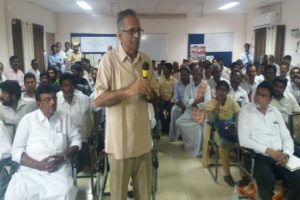Farmers near the uranium mine and mill at Tummalapalle, in India’s Andrha Pradesh state have been protesting contamination of soil and groundwater and the depletion of their irrigation wells by the operations of the nuclear industrial site. Some have had to abandon their homes to the invisible blight and have suffered health problems they blame on the widespread pollution. When independent testing documented the levels of contamination, the Uranium Corporation of India (UCIL) arranged for their own tests before scheduling, then postponing, a meeting with village leaders to dispute the findings and try to calm the growing protest in the heart of India’s richest uranium deposits.
The meeting was finally set for Monday, April 9. That day, police arrested three prominent activists as they traveled to the meeting at the invitation of the farmers.
Taken to Vemula police station were the eminent septuagenarian scientist and environmentalist Dr. Babu Rao, retired from the Indian Institute of Chemical Technology; Jayasree Kakumani of the Human Rights Forum; and Rajesh Serupally, representing the National Alliance of People’s Movements.
It was only following intense protest by the activists and villagers and an immediate letter by E.A.S. Sarma, former secretary of the Government of India to the district collector and the Principal Secretary to the Prime Minister, that Dr. Rao was allowed to participate in meeting with nuclear scientists and officials from UCIL and the Bhabha Atomic Research Centre (BARC). The press was also restricted from the meeting.
The other two activists were held at the police station until 9 p.m., after the meeting had concluded. All three signed papers under protest stating that they would not indulge in such “anti-social activities that disturb peace”.
“We were detained by the police while we were proceeding to the UCIL plant for the meeting. We were kept at the police station and in the evening, I was allowed to participate,” Dr. Rao told the Times of India. He reported that the UCIL officials did not produce any evidence to support the claim of no uranium contamination from the facility.
“There is no proper lining for tailing pond. This is bound to cause pollution through seepage,” he told the Times. The officials told Rao and farmers that they would document their claims later.
“Regardless of what their reports say, it is all happening because of the plant. This time we went in small numbers. Next time all the families from our villages will go there to protest,” said G. Mahesh Reddy, one of the protesting farmers to thenewsminute.com.
